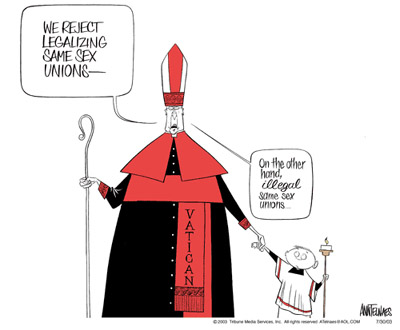There is a very, very,
very deep reason for ought-implies-can, btw. I'll start with what might seem like a sort of non-sequiterish consideration, viz. the question of cognitivism vs. noncognitivism in ethics. Prescriptivist noncognitivism is the idea that ought-assertions are really just fancified imperatives, e.g., "It is wrong to smile on Sunday," means, in code, "Don't smile on Sunday."
Even if this isn't totally true, I do believe that all ought-sentences/assertions
correspond to imperatives/prescriptions. For every, "Thou shalt X," there is a, "Go do X," given to us. Now, if that's true, though, well, consider the following. An assertoric/declarative sentence/function or w/e is satisfied (in the semantic sense) when it is true, i.e. when it "corresponds to the facts." "Delilah doesn't know how to dance," is true if and only if Delilah doesn't know how to dance.
Prescriptive/imperative sentences/functions/w/e are not semantically satisfied in the same way. That is,
- "Go do X," is done if and only if go do X.
is quite the piece of ungrammatical work. However, an imperative sentence
is semantically satisfied if the action commanded thereby, is in fact done.
So...
For us to understand the ability to use the imperative mood in sentence-construction--for imperatives to make sense on a semantic level--the following principle must correctly apply to a given imperative:
- A prescription holds (we'll say) if and only if it can be complied with, for the sake of being complied with.
This holding rule is more important when it comes to figuring out how we know right from wrong/ought from ought-not, but let's go with it for the ought-implies-can question's answer. Now, suppose that a prescription cannot be complied with. Then it doesn't hold. So to issue a prescription that the target couldn't comply with, would be to pre-defeat the possibility of the correlated imperative's semantic satisfaction. Therefore the very act of prescribing something realistically depends on the possibility of acting on the relevant prescription. If an ought-to-X-function implies a do-X-function, then ought-to-X implies can-do-X.
There is more to it (a "proof" of quasi-indeterministic free will, and a "disproof" of utilitarianism in normative ethics, no less!) but I will stop here.




